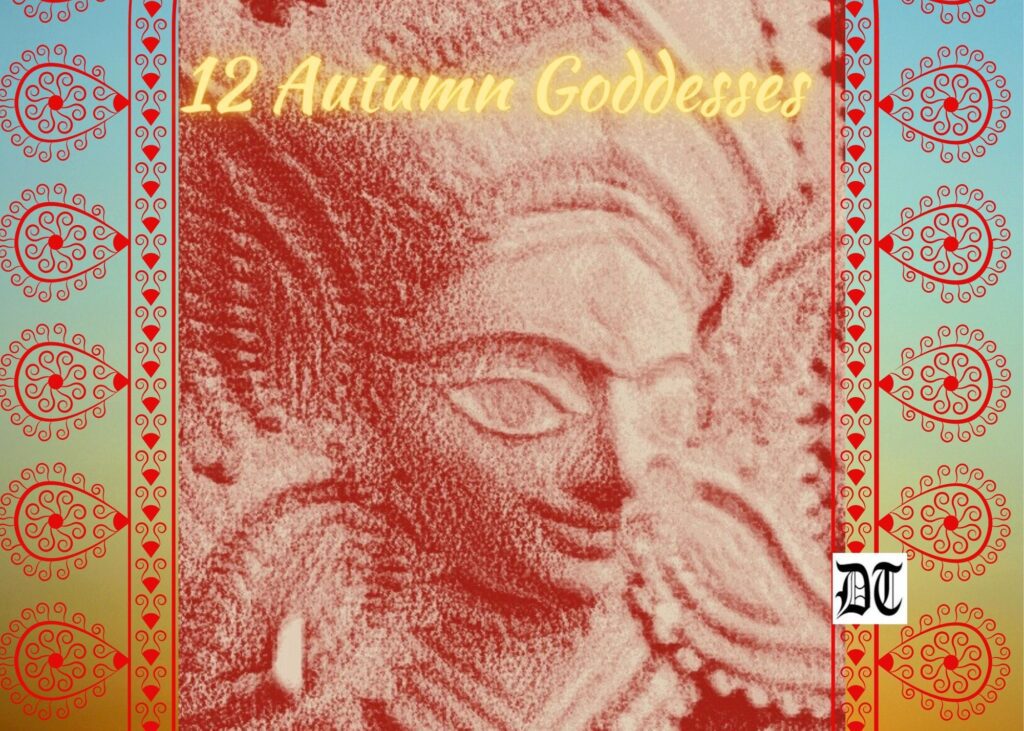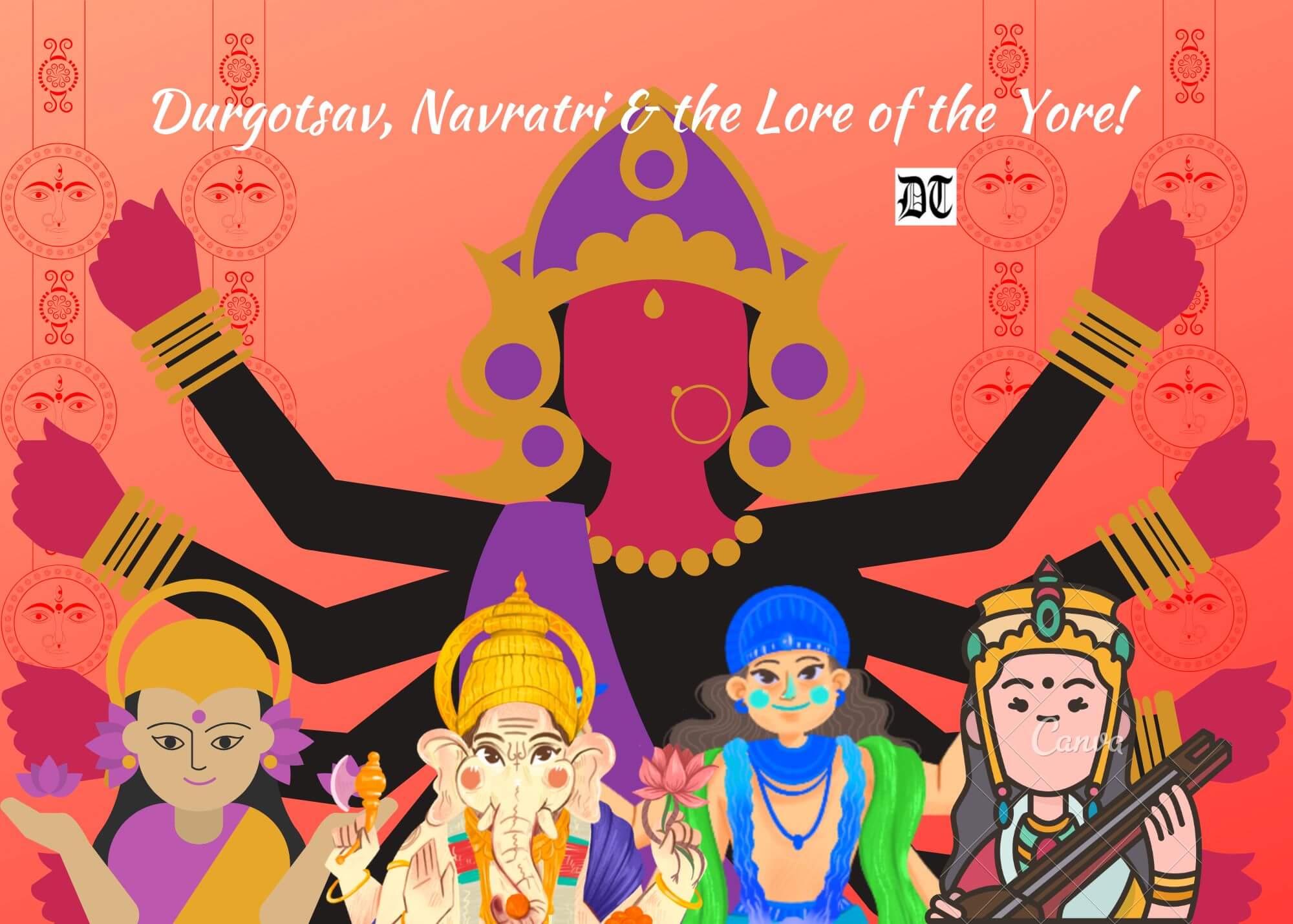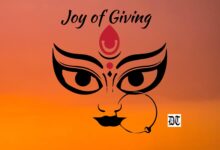Madhu revisits the lore of her childhood – an integral part of her past – that still lingered. The Goddess of Bengal enjoyed non-veg while she was vegetarian in northern states celebrating Navratri. Why so? Find out in an exclusive Special Feature for Different Truths.

The glittering sun smiled on the tiny glass beads that had settled themselves precariously on the blade of the grass. The soft fragrance of Shuili wafted in the mid-autumn air like the amorphous flowing hair of heaven. There was something magical, something intoxicating about the whole atmosphere.
Little Shubhi, with her younger brother Shubro, leapt in the wet grass. Maa had sent them to collect flowers for her morning puja. Manik, their gardener, was on leave, so Maa had sent them, almost forcefully, on that errand.
Shubhi didn’t know morning was so beautiful! She clutched her brother’s arm as they collected the fallen Shuilis from the lawn bed. The shimmering sun was lapping up the dewdrops as it smiled even broadly. Shubhi looked up at the turquoise, ivory sky. That devil of clouds had finally gone hiding. The thunderstorms were scary! It had been raining profusely for the past two weeks. That was the second day when the sun shone brightly.
Bapi said that Shiv Thakur was scolding Dugga Thakur for wanting to visit her parents and her children, so Dugga Thakur was crying.
Bapi said that Shiv Thakur (Lord Shiva) was scolding Dugga Thakur (Goddess Durga) for wanting to visit her parents and her children, so Dugga Thakur was crying. Shiv Thakur refused to grant her permission to visit her parents with her four young children; her two daughters, Lokhi and Saraswati (Goddess Laxmi and Goddess Saraswati) and her sons, Kartik and Ganesh (Lord Ganesha and Lord Kartik).
Maa Durga cried inconsolably, and Shiv Thakur had no other option but to relent.
“Can a husband ever not relent to his wife’s demands?” Bapi asked, winking at Maa.
Having sought her husband’s permission, Dugga Thakur was all smiles and hence the aura of festivity on earth. That intoxicating feel suffused the air.
Bapi wove such delectable stories!
Maa ashchhen (Goddess Durga will arrive shortly).
The preparation to welcome her was in full swing in every Bengali home. She visited her parents only once a year without her husband. So, she and her four young children should be met with the grandest treatments. Every year she stayed only for four days!
Bapi told Shubhi that Dugga Thakur loved to see her people happy.
Bapi told Shubhi that Dugga Thakur loved to see her people happy. Everyone must be dressed in new clothes and have fun: delicious food, a variety of sweets, laughter, and joys. The decorations of the pandals on almost every second corner of the street were also done to please her. After all, she is highly classy and sophisticated.
On Shasti (the sixth day after the new moon) in the month of Ashwin (September/October), the daughter would reach in the evening, and her Somoni (arrival) would be celebrated with dances and songs.
Elaborate spread of menu! Luchi, mangsho (pooris and mutton curry), pulau, macher kalia (pulau and fish curry), egg roll, Mughlai paratha, misti doi (sweet curd), Roshogolla (rasgulla), Chamcham (a sweet) and what not! And then those innumerable trips to the local pandal.
Every morning, dressed in a beautiful new frock, she would visit the pandal with her brother and parents to offer Pushpanjali (flower offerings). Bapi would take leave from office, and schools all over Bengal would remain closed. Durga Puja is observed as a state holiday.
Sitting on the balcony of her apartment in Delhi, Shubhi played with the gold bangle on her right wrist.
Sitting on the balcony of her apartment in Delhi, Shubhi played with the gold bangle on her right wrist. It was Bapi’s last puja gift to her. That was eight years ago.
In the capital, the culture was very different from home. Not that there wasn’t any puja pandal or anything, but it was different from Kolkata.
The Navratri began the next day after the new moon and the consequent fasting period.
This Durga did not eat any non-vegetarian food.
But Maa had said that Durga was married and must eat non-veg because if she didn’t, the harm would befall her husband. Only widows were not supposed to have non-veg.
Moreover, Durga doesn’t visit very often, so her children should be pampered at their maternal home once a year.
A faint smile crossed her lips. How everything fades! Yet those innocuous moments of childhood remain etched in human minds.
Maa was gone long ago, and Bapi’s absence hurt her.
It was Ashtami (the eighth day of Navratri). It was such a special day. Maa always said one must hop eight pandals at least, wearing brand new clothes (the best one out of the new lot).
Here in Delhi, she was alone. Son was away at his workplace, and hubby dear was on tour.
Another ordinary evening!
As she got up to make herself a cup of coffee, the sound of a conch floated from her bedroom.
As she got up to make herself a cup of coffee, the sound of a conch floated from her bedroom. She had mistakenly left the television on.
The chorus of “Bolo- bolo Dugga Mai ki Joy!” stirred a familiar chord as she joined in unmindfully.
Just then, her phone rang. She answered. It was Shubro.
An inexplicable pride overtook her, and she blurted out, “Bhai, we are extremely blessed. Maa, Bapi were the best parents ever!”
Picture design by Anumita Roy, Different Truths





 By
By
 By
By
 By
By